- Home
- Chris Ryan
Vortex cr-4 Page 2
Vortex cr-4 Read online
Page 2
It took a few moments for the old man to realize what he was seeing. The nurse's security badge had fallen to the floor, and she had left without picking it up.
His limbs suddenly froze with adrenaline. His green eyes flickered around: had anyone been looking at him, they might have thought he appeared shifty. But nobody was looking at him — they were all distracted by the blare of the television.
He had to move quickly, that much he knew. He had escaped once before, many years ago and out of a place very different from this. Things had been different then. Less enlightened. When they finally caught him, he had been brutally restrained and dealt with severely. It had blunted his taste for freedom considerably. But lately he had been dreaming of trying again. He was old. He had been assessed as unlikely ever to be suitable for care in the community and so, if he wanted to live a little of his life on the outside now, he would have to take risks. But risks don't seem that risky when you have nothing to lose.
This was what he had been waiting for. An opportunity.
He stood up and sidled over to the inmate the nurse had been looking after. As he did so, he started to prepare himself to make small talk, but there was no need: the inmate did not seem to notice him as he bent down and slowly picked up the string with the nurse's card on it. Hiding it up his sleeve, he shuffled out of the common room.
It was busy in the corridor. He would have preferred to wait for a quieter time of day, but he knew that the nurse would soon realize she had forgotten her badge; when she realized it was missing, the whole hospital would be shut down. He was a familiar enough face, though, to be walking around, so nobody paid him any attention as he made his way towards the exit.
Suddenly he heard a voice. 'Everything all right, Joseph?' it said in a pronounced Cornish accent.
Joseph stopped still, then turned, very slowly, to see the smiling face of one of the young doctors who insisted on asking him foolish questions about 'how he was feeling'. He stared at the doctor for a moment, feeling his face twitching involuntarily. 'Everything's all right, Doctor,' he said finally. 'Everything's all right. Yes.' His head continued to nod as he spoke, and his fingers moved up to flick his floppy hair out of his eyes.
'Good,' the doctor replied, his face concerned. He stepped back a pace or two, his eyes narrowing slightly, before turning and walking off. Joseph stood still, watching him until he turned round a corner out of sight. Then he continued on his way.
There was a receptionist at the exit — a young man whom he did not recognize — but no security guard, he was relieved to see. Joseph stood a little distance away, watching him carefully. He was too old to run, and that would only have drawn attention to him anyway, but he knew he only needed the receptionist to be distracted for a few moments to give him his chance. He felt his bony hands shaking with anticipation.
The moment came soon enough.
The phone rang, and the young man's face lit up. Clearly it was a personal call — a girlfriend, maybe. The phone firmly pressed to his ear, he sat back in his swivel chair and spun round. Joseph didn't waste a second. He strode to the door and swiped the nurse's security card. The door slid open. He took a deep breath and, without looking back, stepped out into the main body of the hospital.
It was even more crowded here, and he went entirely unnoticed. By the time the alarm was raised in the psychiatric wing and the doors were locked down, he was out of the hospital, walking calmly and slowly down the road, an unknowable look in his eyes.
Chapter Two
Later that afternoon, Ben was jumping off a bus at the end of Annie's street. The rain had let up a bit, but there was still a grey drizzle and he was glad of the hood on his raincoat as he hurried down the road and knocked on the door of her parents' large, imposing house. A dog started to bark, and soon the door was opened by Annie's mum, a harassed-looking woman in the middle of a telephone conversation. 'She's upstairs,' she mouthed to Ben, pointing to the stairs. 'In her room.'
Ben smiled, stroked the ears of the Alsatian that was enthusiastically sniffing his legs, then went up to find Annie.
'Hi, An—' he started to say, but stopped when he saw her.
Annie was eccentric, to say the least, but he wasn't quite prepared for this. She was in the middle of her room, standing on one leg on top of a plastic storage box with a pair of woollen tights wrapped round her head as a blindfold. Both arms were raised in the air as she stood perfectly still, like a statue.
'Come in!' she said brightly.
'Er, right.' Ben edged round her and sat on the edge of her bed, not quite knowing if it would be rude to chat. 'It's me — Ben,' he offered finally.
'How's things?' Annie asked, still barely moving.
'Fine.'
He sat there in silence for a moment, looking awkwardly round the room. It wasn't a typical girl's room: there was a dressing table with various pots and potions that were a mystery to Ben, but on the wall there were pictures cut out from military magazines. Ben recognized a Typhoon F1 on one wall, and a jump jet on another. There was also a huge poster of British birds, as well as a photograph of her dad in full RAF regalia. Ben looked at the pictures for a while before turning his attention back to Annie.
'You going to be like that for a long time?' he asked eventually. 'Because I can always come back.'
Annie lowered one of her hands and removed the tights from around her eyes. Then she looked down at herself and managed to seem a bit surprised at the position she was in. 'Sorry,' she said whimsically, before jumping down off the box and kissing Ben lightly on the cheek. 'Just practising. You sort of get into it.'
'I thought tae kwon do was all, you know, beating people up and stuff.'
Annie gave him a cross look. 'Who do you think I am, Ben? A Teenage Mutant Ninja thingy?' Ben thought she sounded a bit more scornful than she needed to. 'I do tae kwon do because it's healthy, OK?'
Ben nodded, doing his best not to look amused. He felt quite sure that Annie had not neglected the martial arts side of her 'exercise' regime, but he didn't fancy being at the receiving end of it, so he kept quiet as he watched her put the plastic box away.
'So,' he said to break the silence, 'where are we going?'
Annie's face lit up as she practically skipped to her bookcase and brought down an ordnance survey map. She indicated that Ben should sit down with her on the floor, then spread the map open in front of them, and pointed at the area just west of the Northumbria National Park. 'Here,' she told him. 'There's a youth hostel we can stay at, and it's dead close to the area where we can find what we're looking for.'
'Right,' Ben said vaguely. 'We looking for something in particular, then?'
'Well, we're not out to spot pigeons, Ben,' Annie told him as she jumped up and selected something else from her bookcase — a magazine this time. Ben saw the blue and white logo of the RSPB on the front. She flicked through until she came across the page she wanted, then handed it to Ben. 'Hen harrier,' she said shortly. 'Very rare. We'll be lucky to find them.'
Ben looked at the pages. There were pictures of two birds — a male and a female, the text told him. The female was brown, and stared out of the picture with a certain ferocity, her beady eyes seeming to bore straight into Ben, her hooked beak sharp and threatening. The male did not appear so aggressive, but seemed no less mysterious to Ben. He was grey — like the ghost of a bird, he thought — and had a striking nobility about him.
'They're amazing,' he said quietly.
Annie nodded soberly. 'They are,' she said.
'Why are they so rare?'
'Because they're carnivorous,' she explained.
Ben looked confused. 'I don't understand. Wouldn't that make them stronger — top of the food chain and all that?'
Annie was still gazing at the magazine on Ben's lap. She reached out and touched the picture of the male hen harrier almost wistfully. 'There's not much they can do about guns, though.'
'Guns?' Ben was shocked. 'Who would want to shoot them?'
'Gamekeepers,' Annie explained. She had a sad kind of smile on her face. 'You see, the hen harrier is a natural predator of grouse. So some gamekeepers have been breaking the law by shooting harriers to keep their grouse stocks up so that people can then pay to shoot the grouse. We humans can do some pretty dumb things sometimes. It's gone on for years. Anyway, it's got really bad lately. There's only about seven hundred and fifty breeding pairs in the whole of the United Kingdom — and the English population is tiny. Only ten pairs in 2004, and my magazine says that there were only fifteen successful nests this year. That makes hen harriers really rare.'
Ben didn't know much about these things, but fifteen nests sounded like the birds were seriously in danger of being wiped out.
'The area where we're going is one of the few spots in the country where you can still see them, and now's the right time of year. If we see one, we need to make a detailed description of it and report it to the RSPB — they keep tabs on things like this because the birds are so rare. I can't promise we'll have any luck, but—'
'It's OK,' Ben interrupted. 'It'll just be nice to get away.' He glanced slightly glumly out of Annie's bedroom window at the persistent drizzle. 'Hope the weather clears up, though.'
'Yeah,' Annie replied, 'because the thing is, we'll probably die if we get wet, won't we?' She elbowed Ben playfully but — he thought — a bit sharply in the ribs. 'You're not going to wimp out on me because of a few drops of water, are you?'
Ben smiled, and he thought back momentarily to the floods in London and the torrential rains in the Congo.
'No,' he said quietly, 'I'm OK with a bit of rain. You don't have to worry about that.' And he went back to staring at the picture of the hen harrier, and wondering if they might be lucky enough to catch sight of one in real life.
Inspector Tim Matthews was a good deal younger than the clinical psychiatrist sitting opposite, but that didn't stop him looking at the guy with an expression of incredulity.
'You're trying to tell me that he just walked out?'
Dr Hopkinson raised his hands in the air and shrugged slightly. 'I know, it doesn't sound good, but there we have it,' he conceded. 'I guess we took our eye off the ball for a moment.'
The room in which they were sitting — Dr Hopkinson's study — was cluttered with files, papers and well-thumbed medical books.
'How did it happen? I thought this place was meant to be secure.'
'It is,' Dr Hopkinson replied. 'The only way in and out is using swipe cards, and they're only given to authorized personnel. Unfortunately, one of our nurses mislaid hers when she was attending to a patient, and our man was able to grab it and leave without being noticed. She's getting an official warning as we speak, but the truth is that it was just a human error.'
The policeman sighed and pulled a notebook out of his jacket. 'All right then,' he said in a resigned tone of voice. 'You'd better tell me what you know about him.'
Hopkinson looked seriously at him. 'You do understand, officer, that this is confidential. As his doctor, I have a certain duty towards my patients.'
'All we want to do is find him, Doctor Hopkinson.'
The doctor nodded, and placed his fingers together. 'His name is Joseph Sinclair. He's been sectioned under the Mental Health Act for the past twenty-five years — since the act was established, in fact. Before that, he was in a number of institutions. The records are a bit vague.' He smiled apologetically. 'I'm afraid the medical profession has not always been quite as enlightened in these matters as we are now.'
'Any family?'
'He's mentioned a brother, but not in kindly terms. Certainly there's no contact — he hasn't had a visitor for as long as I've been his doctor.'
The policeman nodded. 'What's wrong with him?' he asked.
'A classic case of paranoid schizophrenia,' Dr Hopkinson replied. 'Textbook stuff, really — voices in his head, government conspiracies, men in black out to get him. He's convinced that his mental illness derives from treatments he was given by a government agency when he was a young man. It's a very common delusion. Most of the time he keeps quiet about it, but now and then he exhibits acute psychotic episodes: when that happens, we have to keep him restrained, for his own good and that of others.'
Inspector Matthews looked sharply at him. 'Violent tendencies?'
Dr Hopkinson thought about that for a moment. 'Difficult to say,' he answered finally, 'because we never let it get that far. But with this kind of psychosis, you can never count it out. That's why he's been assessed as unsuitable for any form of community care — he needs to be in a secure institution like ours, for his own good. And now he's out there without his medicines — a few days like that and his symptoms are very likely to escalate.'
'OK. Do you have a picture of him?'
The psychiatrist opened a file in front of him and withdrew a photograph. 'This was taken about three years ago,' he said. 'He hasn't changed much since.'
Inspector Matthews looked at the picture. The man who stared back out at him had a hooked nose and grey floppy hair. But it was his eyes that stood out the most. Piercing, green, beady almost — like a hawk. There was something about them that made him feel distinctly uncomfortable. 'How old is he?' the policeman asked quietly.
'Seventy-one, but fit for his age.'
'Still,' Inspector Matthews replied, 'he's an old man. We'll alert the local police forces and search the surrounding area. I can't imagine he'll have it in him to get too far.'
But Dr Hopkinson didn't seem so convinced. 'Inspector Matthews,' he said politely, 'I hope you don't think I'm trying to tell you your job, but—' He hesitated.
'Go on, Doctor,' the policeman encouraged.
'Don't underestimate Joseph Sinclair. He's old, and his mental health is frail. But he's not stupid — I've had enough conversations with him to establish that. He has a scientific mind, he's a voracious reader and he's no fool.'
'What are you trying to tell me, Doctor?'
Dr Hopkinson looked away for a moment. 'I don't know,' he replied. 'Just don't expect to find him sitting in a field somewhere talking to the daisies. Just because he suffers from psychosis, it doesn't mean he can't merge into society perfectly easily.'
The policeman nodded. 'Point taken,' he said. 'In the meantime, you'd better hope the press don't get hold of this — they'd have a field day.'
Dr Hopkinson smiled. 'I'm concerned about my patients,' he said honestly. 'Not chattering journalists.'
He watched as the policeman closed his notebook, put it away and stood up to leave. 'Thank you, Doctor Hopkinson,' he said. 'I'll be in touch.' Inspector Matthews made to leave, but before he reached the door he stopped and turned to look back at the doctor. 'Just one other thing,' he said, a certain hesitation in his voice.
'Of course,' the doctor replied.
'If this guy is as sharp as you say, all the stuff about government conspiracies and the like — has anyone actually checked that it isn't true ?' He seemed a bit embarrassed to be asking the question.
Dr Hopkinson stood up. 'Officer!' he exclaimed. 'I didn't have you down as a conspiracy theorist.' Suddenly his face became more serious as he stared directly at the policeman. 'Believe me,' he said clearly, 'we don't lightly section people. I've been in this job for twenty years now. If I had a pound for every time I heard a paranoid schizophrenic tell me there was a government conspiracy to silence them, I promise you, I'd be a rich man. Joseph Sinclair is smart, but he's delusional. He needs to be back here, where we can look after him.'
The policeman appeared chastened, even slightly embarrassed to have asked the question. 'Of course, Doctor,' he said politely, then left the room, closing the door firmly behind him.
Chapter Three
Haltwhistle Station was like a ghost town when they arrived.
It had been a five-hour train journey from Macclesfield to the sleepy rural village that claimed to be the exact geographical centre of the country but which seemed to Ben to be the end of the earth. Ben had spent
some of the time being instructed in ornithological matters by Annie. She made, he thought, a strange sight, dressed in army surplus combat trousers and boots as she pored over pictures of obscure British birds, but that was her through and through. Ben was also dressed in sturdy outdoor gear, and was glad of it: the rain had let up, but each time they changed train, first at Manchester, then Lancaster and finally onto an elderly, two-carriage boneshaker at Carlisle, the air seemed to grow damper. He could hardly believe it was late summer.
On the last train they fell into a comfortable silence. Ben picked up a newspaper that somebody had left lying around and flicked through it. One of the main stories grabbed his interest. NORTH KOREA AGREES NUCLEAR STEPDOWN said the headline. He read further:
North Korea has agreed to disable its principal nuclear reactor, and to submit details to the West of its nuclear programme in a move that is widely seen as a peace overture from the totalitarian regime of this stricken country. He handed the newspaper to Annie and tapped the article. 'Looks like your dad might be out of a job if peace keeps breaking out everywhere,' he said archly.
Annie glanced at the article. 'Hardly,' she said. 'There's always some regime out there that thinks it's OK to start killing people. If it's not the North Koreans, it'll only be someone else.'
'I suppose you're right,' Ben agreed glumly, taking the paper back and continuing to flick through it.
When the time finally came to disembark for the last time, they lugged their rucksacks off the train with only a handful of other passengers, and then found the bus stop, a little way from the slate-roofed ticket office, where they waited for their bus to the youth hostel. Evening was drawing in now, and the place where they stood was practically deserted. It had already been a long day, and Ben and Annie stood in silence as they waited for the bus that didn't seem to want to come.

 Global Strike
Global Strike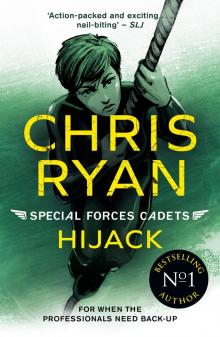 Hijack
Hijack Special Forces Cadets 2
Special Forces Cadets 2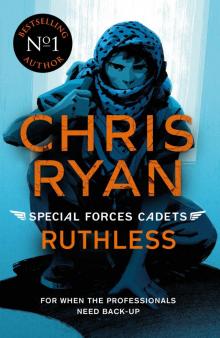 Ruthless
Ruthless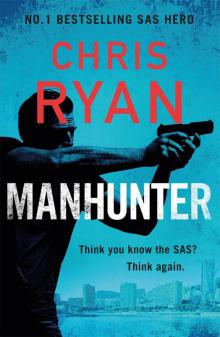 Manhunter
Manhunter Special Forces Cadets 1
Special Forces Cadets 1 Red Strike
Red Strike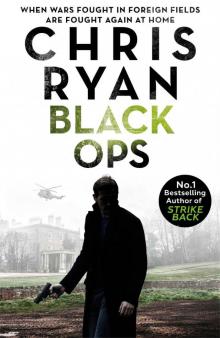 Black Ops
Black Ops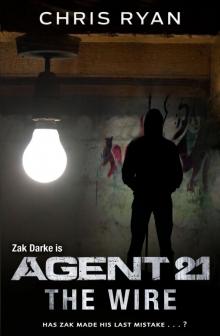 Agent 21: The Wire
Agent 21: The Wire Land of Fire
Land of Fire Alpha Force: Fault Line
Alpha Force: Fault Line Under Cover (Agent 21)
Under Cover (Agent 21)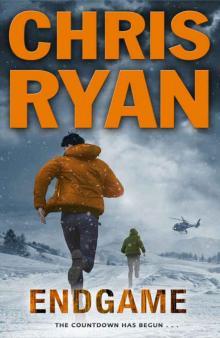 Endgame (Agent 21)
Endgame (Agent 21) Red Centre
Red Centre Blackout
Blackout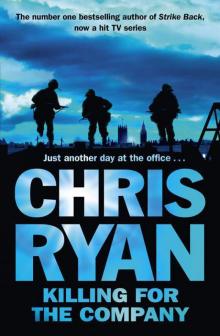 Killing for the Company
Killing for the Company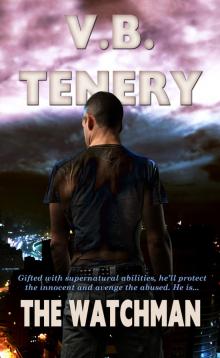 The Watchman
The Watchman Osama
Osama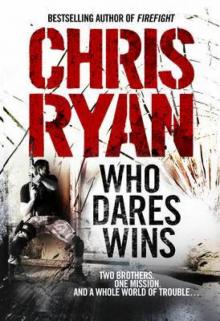 Who Dares Wins
Who Dares Wins The Kremlin Device
The Kremlin Device Hunter Killer
Hunter Killer Alpha Force: Untouchable
Alpha Force: Untouchable Stand By Stand By
Stand By Stand By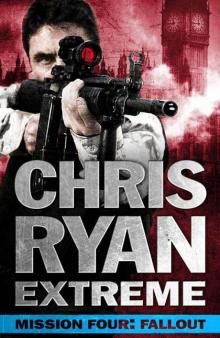 Chris Ryan Extreme: Hard Target: Mission Four: Fallout
Chris Ryan Extreme: Hard Target: Mission Four: Fallout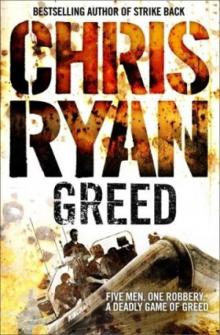 Greed mb-1
Greed mb-1 Alpha Force: Desert Pursuit
Alpha Force: Desert Pursuit Strike Back
Strike Back Greed
Greed The Bay Bulls Standoff
The Bay Bulls Standoff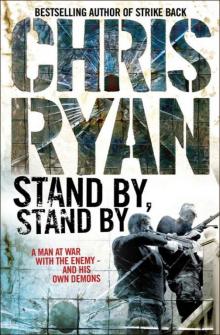 Stand By, Stand By gs-1
Stand By, Stand By gs-1 Outbreak
Outbreak Hunted
Hunted Vortex cr-4
Vortex cr-4 Rat-Catcher
Rat-Catcher Vortex
Vortex Bad Soldier
Bad Soldier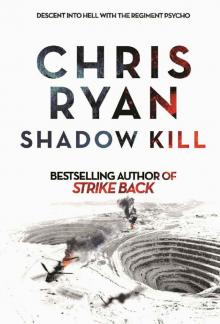 Shadow Kill: A Strikeback Novel
Shadow Kill: A Strikeback Novel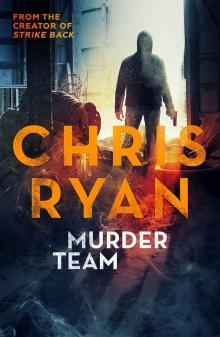 Murder Team (Kindle Single)
Murder Team (Kindle Single) One Good Turn
One Good Turn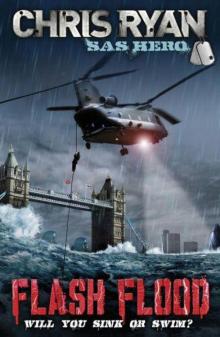 Flash Flood cr-1
Flash Flood cr-1 Night Strike
Night Strike Wildfire
Wildfire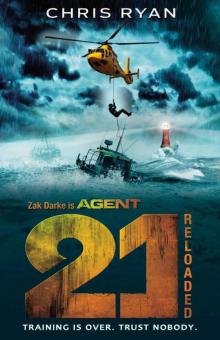 Agent 21: Reloaded: Book 2
Agent 21: Reloaded: Book 2 Chris Ryan Extreme: Hard Target: Mission Two: The Rock
Chris Ryan Extreme: Hard Target: Mission Two: The Rock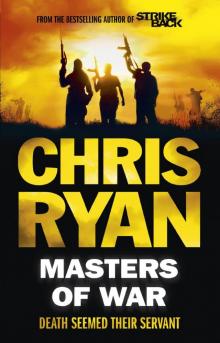 Masters of War
Masters of War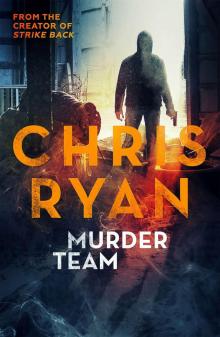 Murder Team
Murder Team War Dog
War Dog Wildfire cr-2
Wildfire cr-2 Survival
Survival The One That Got Away - Junior edition
The One That Got Away - Junior edition The Hit List
The Hit List The Kill Zone
The Kill Zone Medal of Honor
Medal of Honor Battleground
Battleground Twister
Twister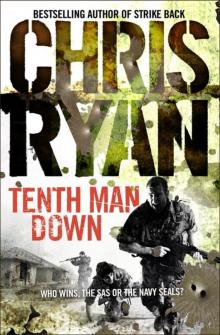 Tenth Man Down gs-4
Tenth Man Down gs-4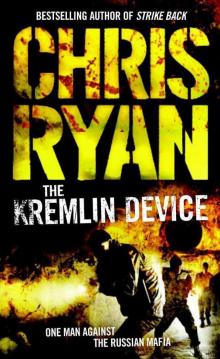 The Kremlin Device gs-3
The Kremlin Device gs-3 Hostage
Hostage Bad Soldier: Danny Black Thriller 4
Bad Soldier: Danny Black Thriller 4 Alpha Force: Blood Money
Alpha Force: Blood Money Firefight
Firefight Chris Ryan Extreme: Hard Target: Mission One: Redeemer
Chris Ryan Extreme: Hard Target: Mission One: Redeemer Hit List
Hit List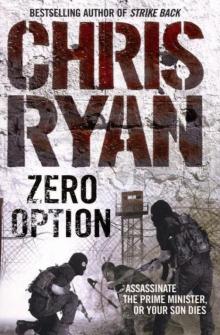 Zero Option gs-2
Zero Option gs-2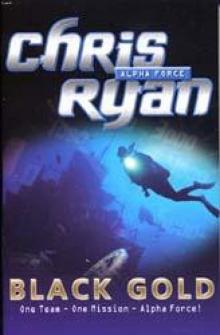 Black Gold
Black Gold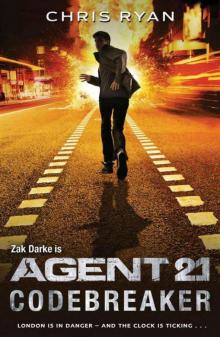 Agent 21: Codebreaker: Book 3
Agent 21: Codebreaker: Book 3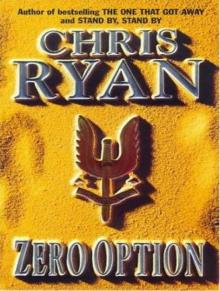 Zero Option
Zero Option Ultimate Weapon
Ultimate Weapon Tenth Man Down
Tenth Man Down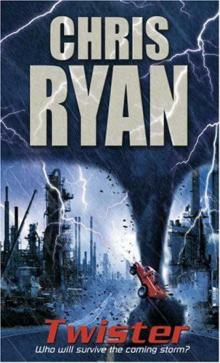 Twister cr-5
Twister cr-5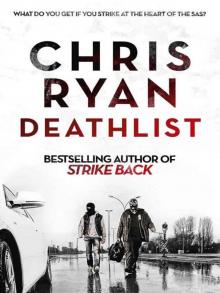 Deathlist
Deathlist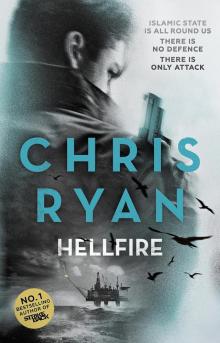 Hellfire
Hellfire Flash Flood
Flash Flood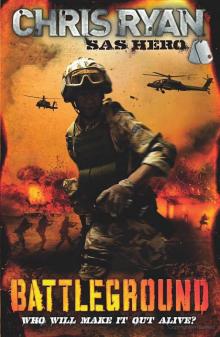 Battleground cr-6
Battleground cr-6 The Increment
The Increment